You ask, we answer
At our recent Industry Forum, we simply couldn’t get to all the attendee questions submitted for the panel. In this article, we’re picking up where the panel left off, sharing responses to the questions we didn’t have time to address live.
Still have a burning question? We’d love to hear from you: contact@edq.qld.gov.au
❓Are there plans to consider industrial land releases in conjunction with inland rail hubs?
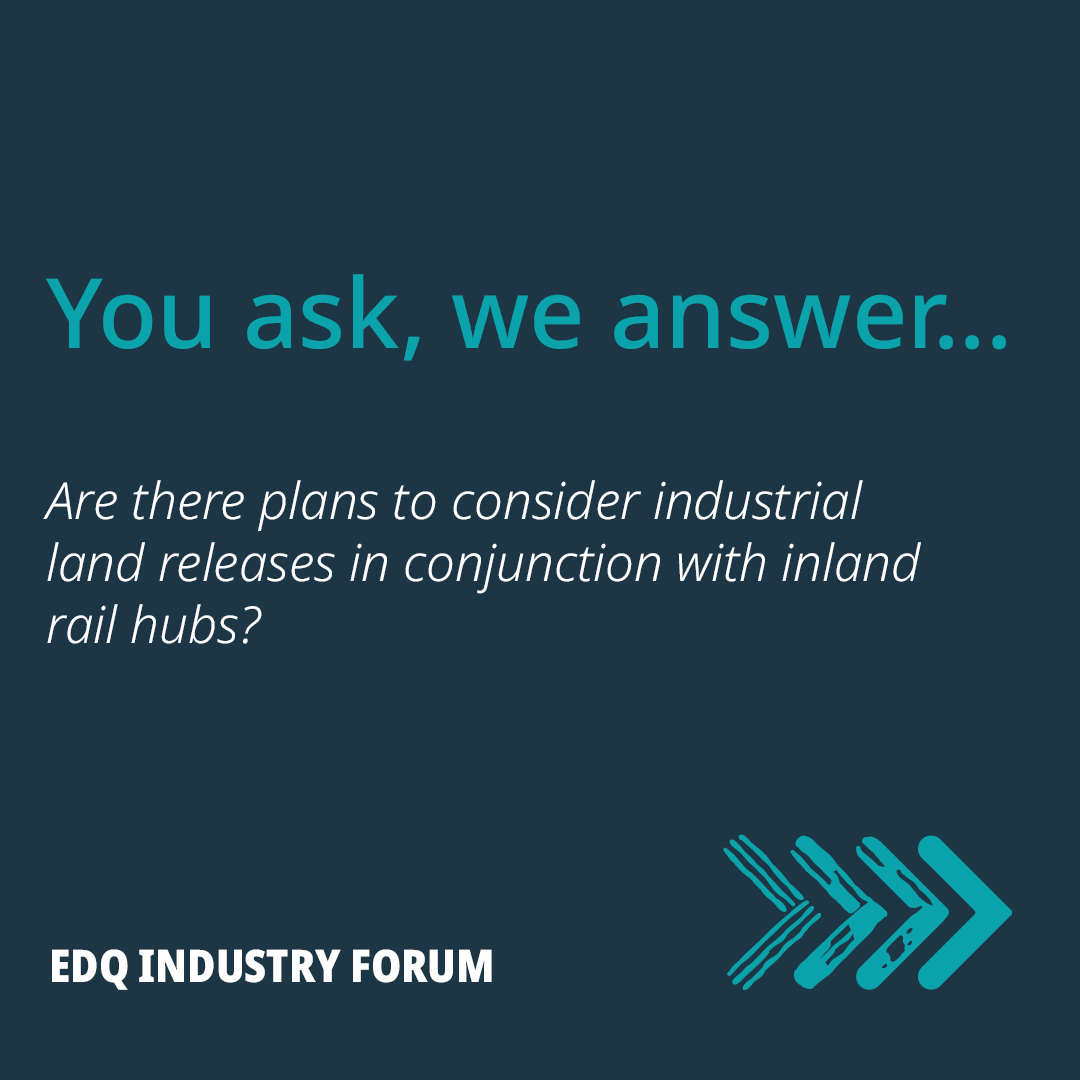 ✅ Yes, there are active plans to consider industrial land releases in conjunction with inland rail hubs in South-East Queensland.
✅ Yes, there are active plans to consider industrial land releases in conjunction with inland rail hubs in South-East Queensland.
The Australian and Queensland governments are collaborating on the development of a business case for an intermodal terminal in Brisbane. The terminal aims to support Inland Rail by increasing freight capacity and enabling high-performance 1,800m double-stacked trains. The design of the terminal will integrate with the broader Inland Rail project development, and opportunities for integration within a larger intermodal logistics precinct will be explored.
Additionally, the proposed Ebenezer Regional Industrial Area (ERIA) with the Ipswich City Council LGA, is being developed as a future industrial precinct in South-East Queensland. This area is planned to support national supply chains and the proposed Ebenezer Intermodal Terminal, which will be part of the Inland Rail network. The development of ERIA is expected to unlock approximately 3,500 full-time equivalent jobs across various industries, including manufacturing, transport, postal, and warehousing.
These initiatives demonstrate a coordinated approach to developing industrial land in conjunction with inland rail hubs, aiming to enhance freight capacity and support economic growth in the region.
❓What is EDQ’s process for facilitating market-led proposals?
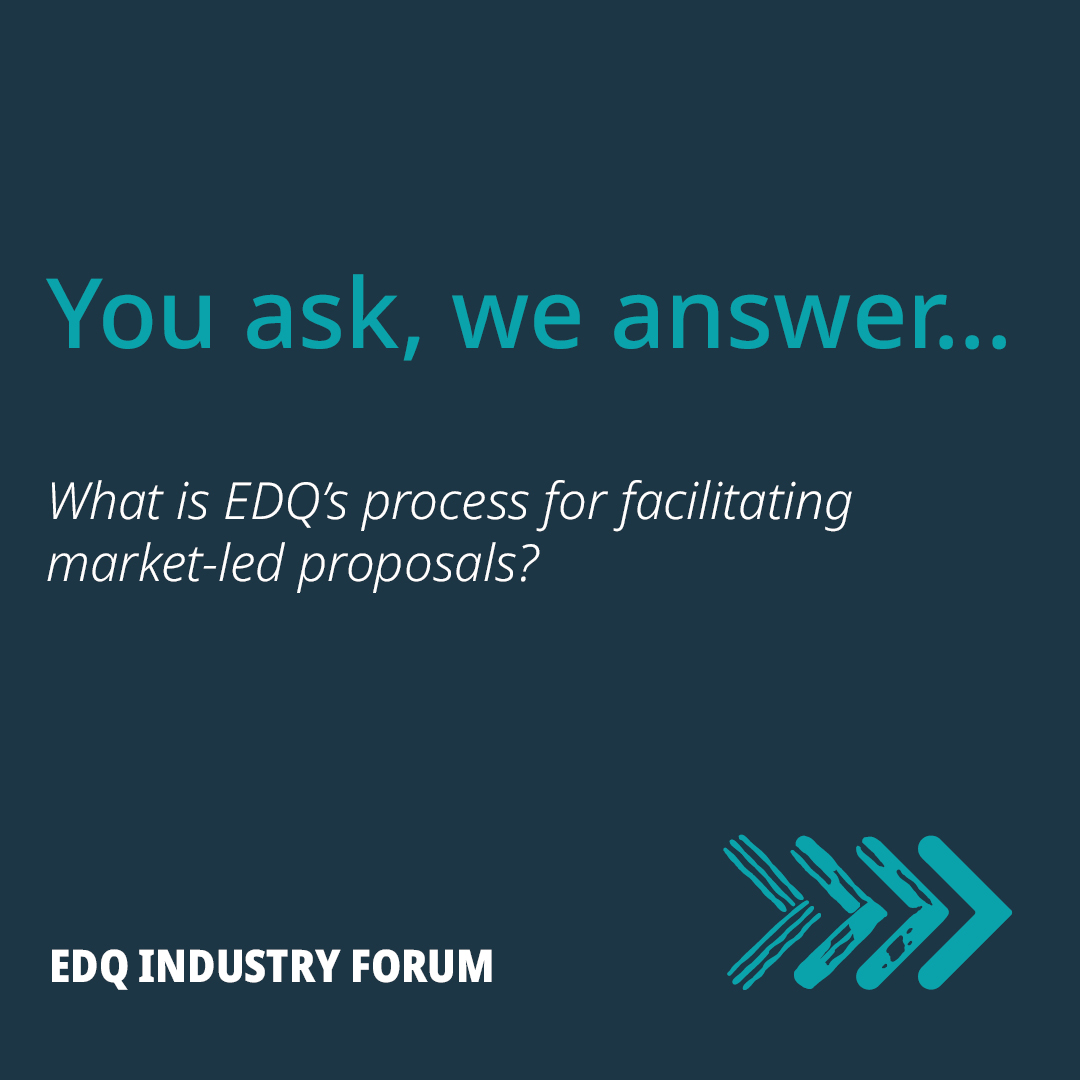 ✅ EDQ has a formal process for considering exclusive dealings - where a private company proposes to buy or lease government land without going through a public tender.
✅ EDQ has a formal process for considering exclusive dealings - where a private company proposes to buy or lease government land without going through a public tender.
Here’s how it works:
1. Submit a proposal – The proponent provides details and signs a confidentiality deed.
2. Assessment – EDQ reviews the proposal to ensure it offers fair value, aligns with government priorities, delivers public benefit, and is otherwise suitable for an exclusive dealing arrangement.
3. Approval & negotiation – If approved, EDQ negotiates directly with the proponent to finalise the deal.
This process gives industry a clear pathway to propose innovative projects while ensuring public land delivers maximum value.
![]()
❓EDQ is committed to faster approvals than councils. Where councils are the delegated authority, how will EDQ improve these timeframes?
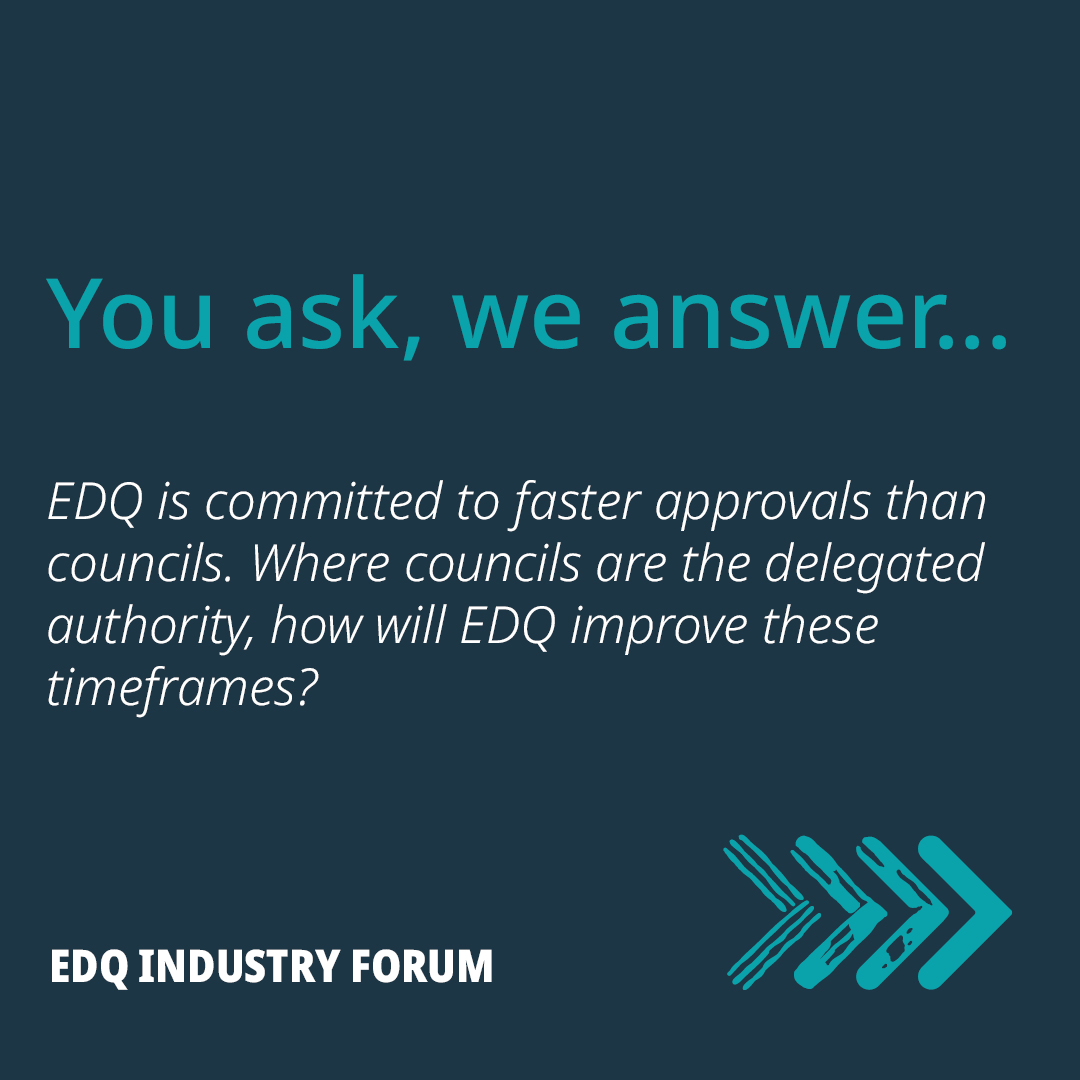
✅ We plan to work closely with delegated councils to improve development timeframes by embedding our new ‘faster, better, together’ approach. This means increasing engagement with local governments, meeting regularly, monitoring performance and providing support where needed to meet PDA service delivery.



❓How can EDQ enhance collaboration with authorities and utility providers to better support industry?
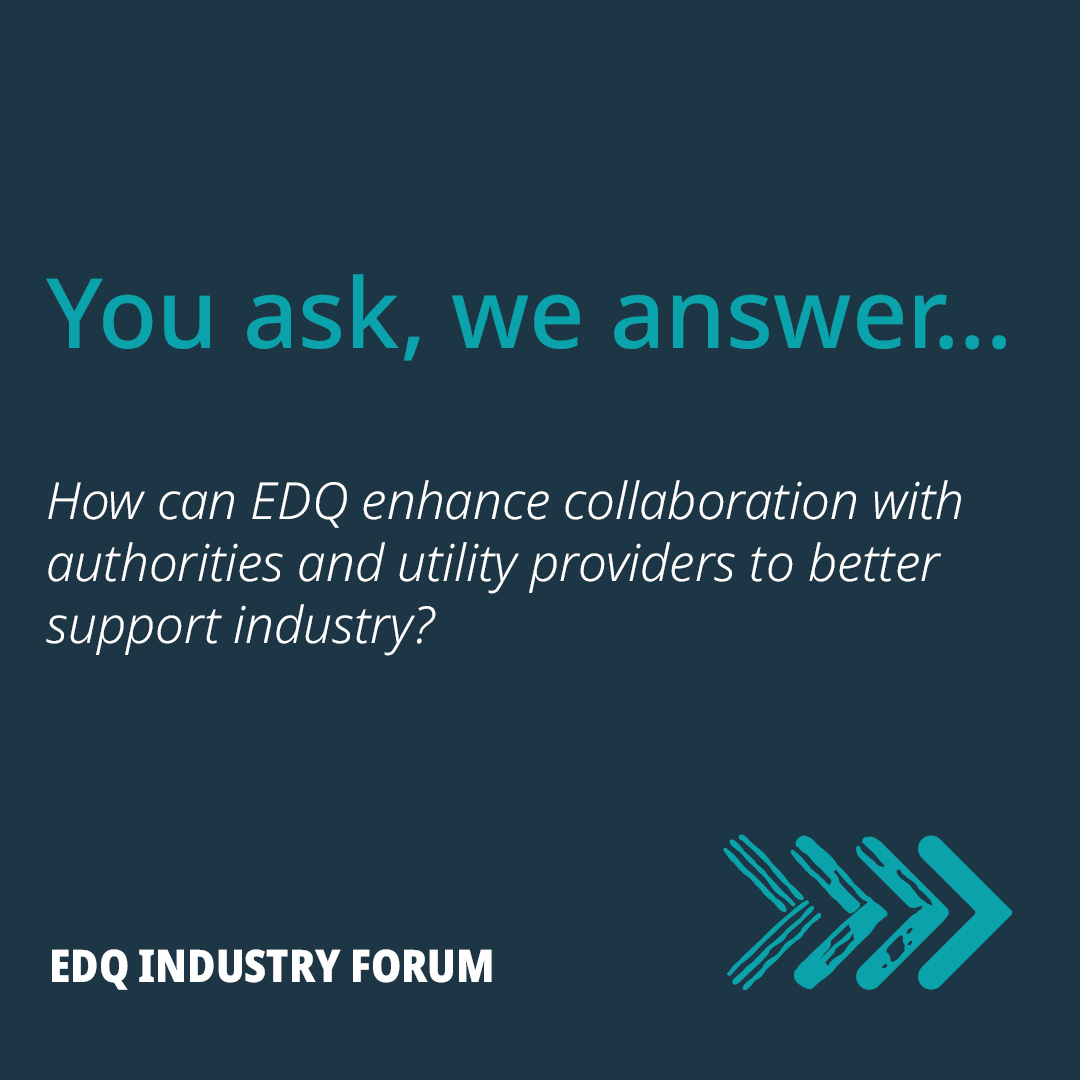 ✅ We are strengthening our partnerships with utility providers and authorities through more structured engagement and earlier coordination. We are actively listening to industry feedback and using it to shape practical solutions to unlock land and accelerate development. We will continue to foster two-way dialogue to build stronger relationships that support delivery and drive outcomes across the State.
✅ We are strengthening our partnerships with utility providers and authorities through more structured engagement and earlier coordination. We are actively listening to industry feedback and using it to shape practical solutions to unlock land and accelerate development. We will continue to foster two-way dialogue to build stronger relationships that support delivery and drive outcomes across the State.
We know that some decisions sit outside EDQ’s direct control, but we’ll work hand-in-hand with industry to advocate for better housing and economic outcomes and help unlock development.


❓You mentioned encouraging the team to engage more with the market and spend less time confined to 1 William Street. How will this be actioned?
 ✅ We are actively embedding a culture of service excellence and stakeholder engagement across EDQ. This means our team will be more visible and accessible, spending time on-site in Priority Development Areas (PDAs), meeting with industry and partners and gaining a deeper understanding of local opportunities and challenges. This shift will ensure our decisions are grounded and we deliver outcomes that reflect the needs of industry and the local community. We will prioritise being present, responsive and connected to the places we help shape. And if you’re finding that we’re not, we want to hear from you.
✅ We are actively embedding a culture of service excellence and stakeholder engagement across EDQ. This means our team will be more visible and accessible, spending time on-site in Priority Development Areas (PDAs), meeting with industry and partners and gaining a deeper understanding of local opportunities and challenges. This shift will ensure our decisions are grounded and we deliver outcomes that reflect the needs of industry and the local community. We will prioritise being present, responsive and connected to the places we help shape. And if you’re finding that we’re not, we want to hear from you.


❓What steps are being taken to increase the frequency of meetings with external stakeholders, including LGA forums, to improve collaboration?
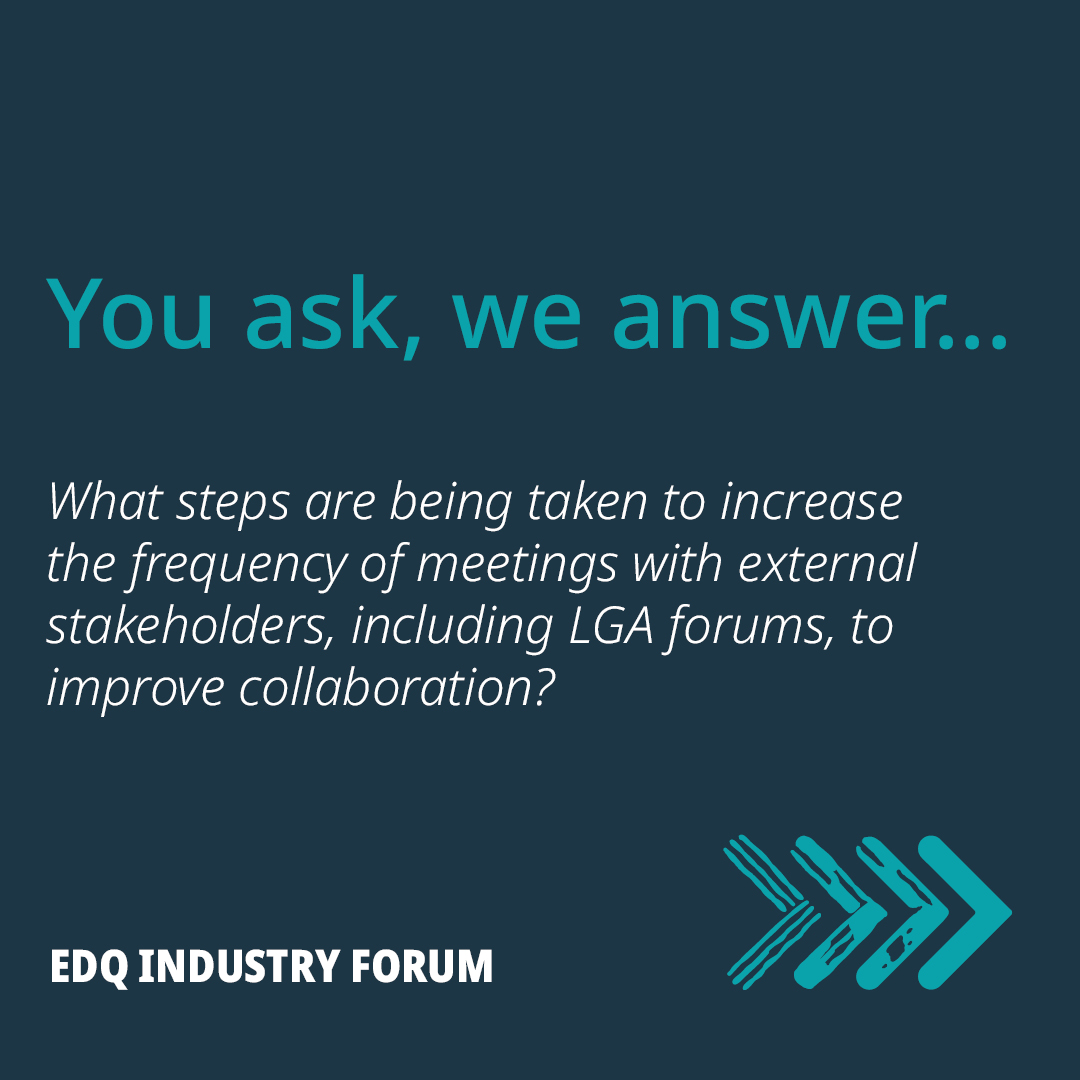 ✅ We are increasing the frequency and structure of our engagement with external stakeholders, including councils and industry forums. A recent example is the Memorandum of Understanding signed between EDQ and UDIA Queensland, which sets out a shared commitment to meet regularly, collaborate on industry challenges and work towards common goals. EDQ is conducting Local Government Area (LGA) Forums as part of EDQ’s refreshed, customer focused approach. For feedback on engagement, we encourage you to reach out to our Executive Leadership Team here.
✅ We are increasing the frequency and structure of our engagement with external stakeholders, including councils and industry forums. A recent example is the Memorandum of Understanding signed between EDQ and UDIA Queensland, which sets out a shared commitment to meet regularly, collaborate on industry challenges and work towards common goals. EDQ is conducting Local Government Area (LGA) Forums as part of EDQ’s refreshed, customer focused approach. For feedback on engagement, we encourage you to reach out to our Executive Leadership Team here.


❓ How will EDQ manage land releases to avoid oversupply in the market? Will there be engagement with industry before establishing the pipeline?
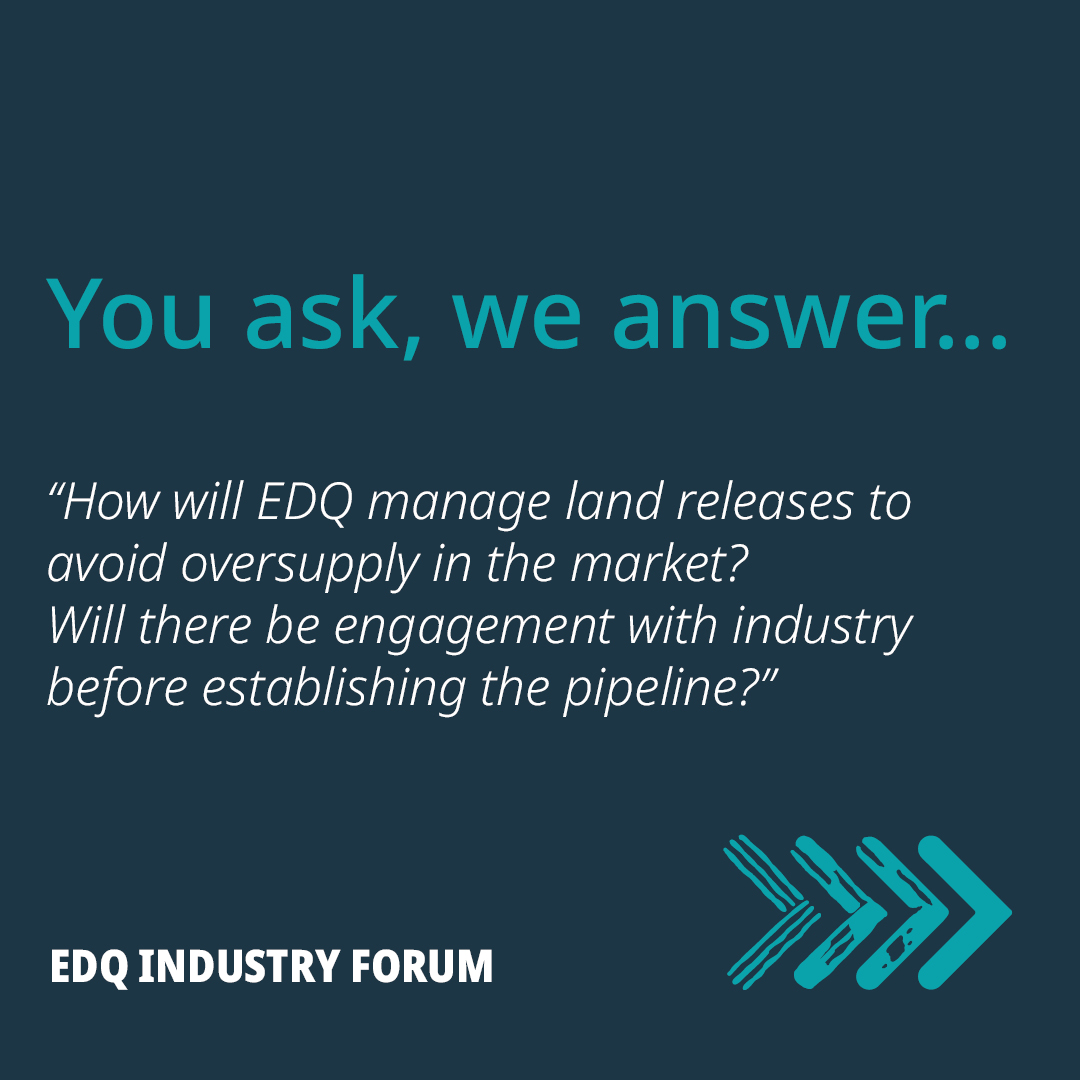 ✅ EDQ is focused on unlocking surplus or underutilised Government land to support housing and economic growth. Over the coming period, a variety of sites will be released across different regions, targeting a mix of markets and housing needs.
✅ EDQ is focused on unlocking surplus or underutilised Government land to support housing and economic growth. Over the coming period, a variety of sites will be released across different regions, targeting a mix of markets and housing needs.
Where appropriate, EDQ will consult with industry through formal engagement processes. The timing and strategy for each land release will depend on the specific site and its intended market.
To stay informed, interested parties can register for updates on EDQ’s website here or keep following us on LinkedIn for the latest news.
![]()
![]()
❓Will EDQ prioritise greenfield sites, or will there also be a focus on Olympic and inner-city precincts?
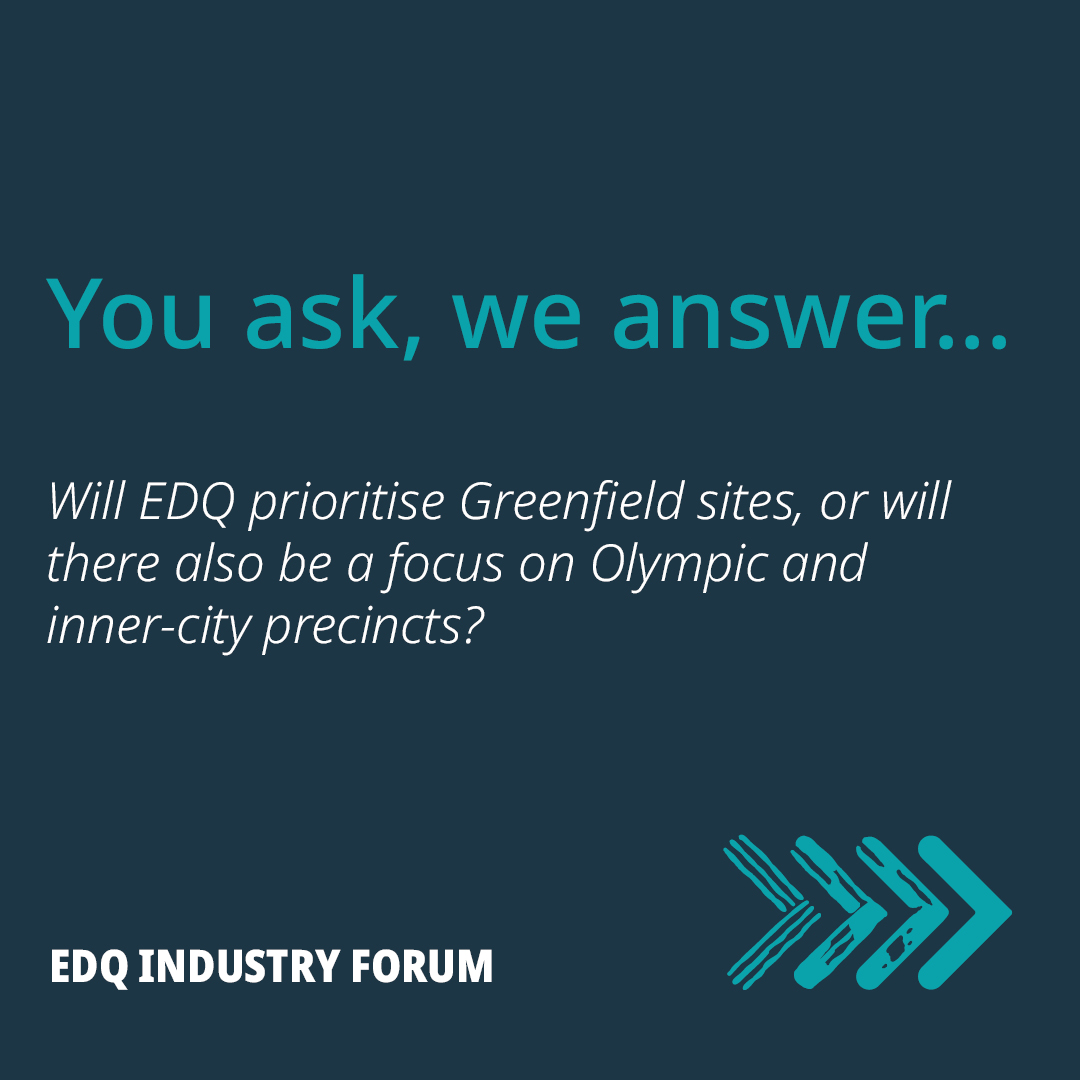 ✅ EDQ is committed to unlocking land across Queensland — in both new (greenfield) and existing (infill) areas. No single type of site will be prioritised.
✅ EDQ is committed to unlocking land across Queensland — in both new (greenfield) and existing (infill) areas. No single type of site will be prioritised.
We’re working to ensure a balanced mix of land releases across metro and regional locations, supporting a range of housing needs. Our focus is statewide and goes well beyond just Olympic or inner-city precincts.

![]()
![]()
❓Will new housing sites prioritise transport sustainability, or will they remain car-dominated?
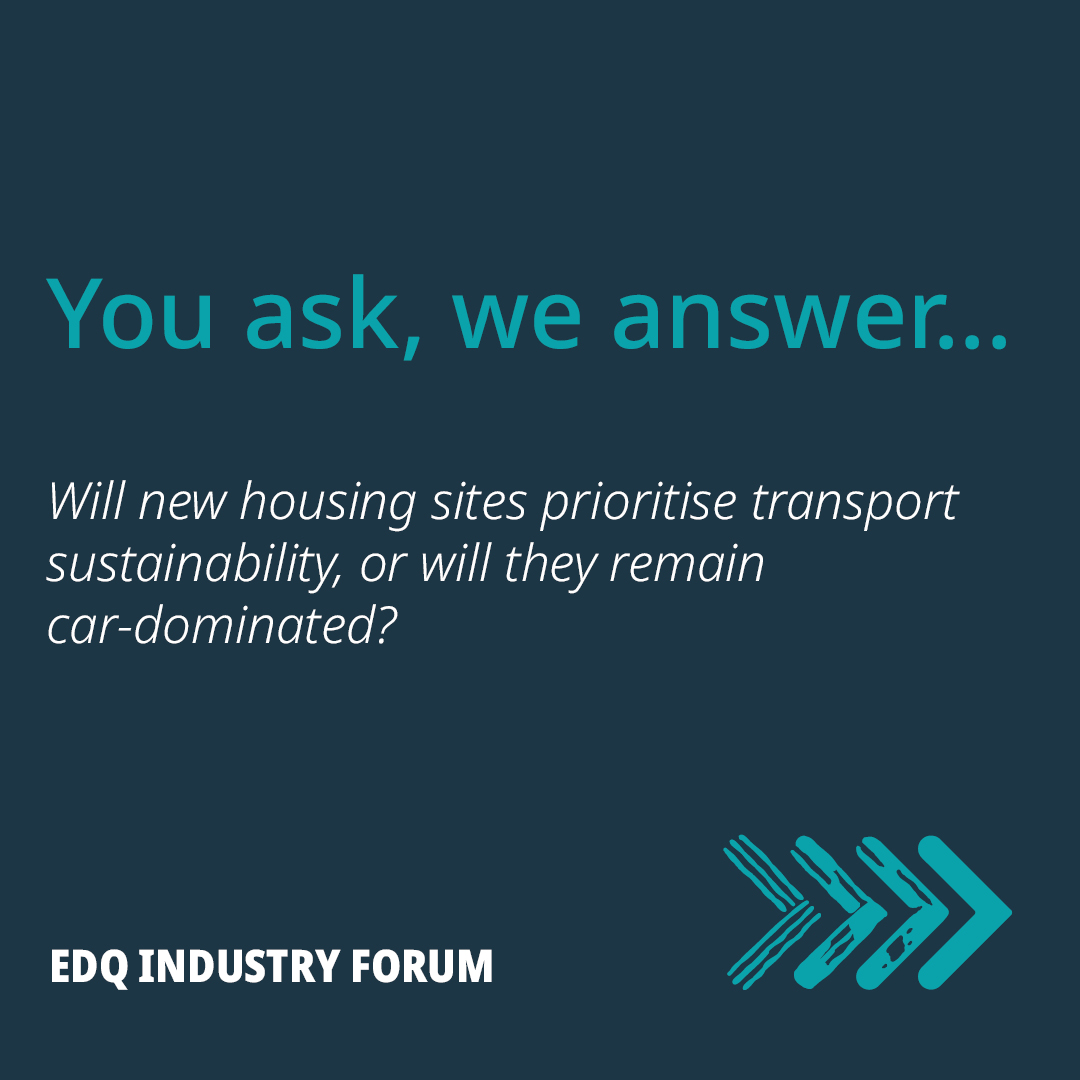 ✅ EDQ is designing transport networks in both greenfield and infill Priority Development Areas to support a mix of transport options, including cars.
✅ EDQ is designing transport networks in both greenfield and infill Priority Development Areas to support a mix of transport options, including cars.
Our planning encourages strong connections between neighbourhoods and communities by making it easier to walk, cycle and use public transport. A well-connected street layout ensures everyone can get around easily, while active and public transport are key parts of the overall network.
Whether it's a new development or an urban renewal site, EDQ provides detailed planning to deliver a fully integrated transport system that supports sustainable travel choices.
![]()
![]()
❓Is there scope for EDQ to fund infrastructure through special rates levied on properties, as allowed under its Act but not currently utilised?
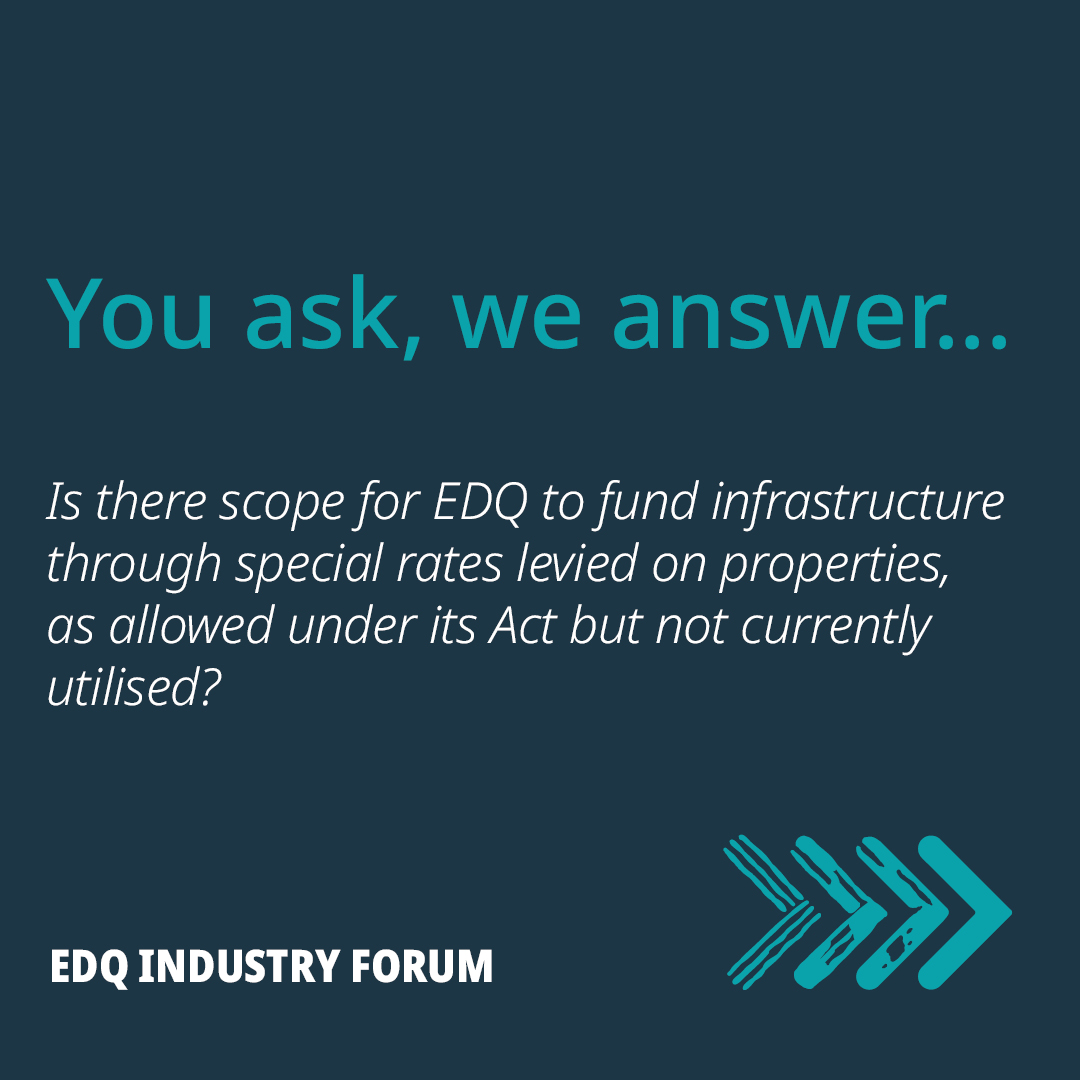 ✅ EDQ has several ways to fund infrastructure in Priority Development Areas (PDAs), including:
✅ EDQ has several ways to fund infrastructure in Priority Development Areas (PDAs), including:
- Catalyst Infrastructure Funding: Used to kickstart development in greenfield PDAs by funding major infrastructure that’s too costly for a single developer and wouldn’t otherwise be built.
- Sub-Regional Infrastructure Charges: These charges help fund infrastructure outside the PDA like roads, water and sewer systems that are directly impacted by PDA development.
- Special Infrastructure Levy (SIL): Under the Economic Development Act 2012, EDQ can apply a SIL to properties in PDAs to help fund infrastructure outside the PDA that may be affected by development. EDQ does not currently apply any SILs to PDAs.
![]()
Last updated: 20 August 2025



